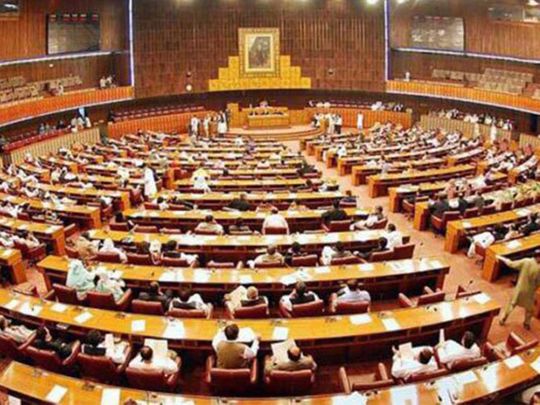
ISLAMABAD: Pakistan’s National Assembly on Friday formally notified the bill titled ‘Supreme Court (Practice and Procedure) Act 2023’ which aims to clip the powers of the Chief Justice of Pakistan (CJP) over suo motu notices and in constitution of benches.
The new legislation also grants the right to appeal in all suo motu cases with retrospective effect.
The bill that was earlier passed by the National Assembly of Pakistan and the Senate in the last week of March 2023 had sparked controversy and President Dr Arif Alvi returned it to the Parliament for reconsideration on April 8.
However, a joint session of the Parliament passed it again on April 10 with certain amendments.
Deemed to have President’s assent
The bill was again referred to the president for his assent who again opposed it and sent it back on April 19. However, as per the Constitution of Pakistan, if a bill passed by a joint sitting of the Parliament is not signed by the President within 10 days, it is deemed that the President has given his assent.
Pakistan’s National Assembly also announced on its twitter account on Friday “Supreme Court (Practice and Procedure) Act 2023 has finally ceased to exist after the National Assembly Secretariat notified that the bill of the Majlis-e-Shura (Parliament) deemed to have been assented by the president (with effect from April 21, 2023) under Clause (2) of the Article 75 of the Constitution of Islamic Republic of Pakistan.”
Struck down by Supreme Court
The Supreme Court of Pakistan had also barred the government from enforcing the ‘controversial’ bill, saying the move would “prevent the imminent apprehended danger that is irreparable” as soon as the bill becomes an act of parliament.
In its order dated April 13, an eight-member bench headed by Chief Justice Umar Ata Bandial held: “The moment that the bill receives the assent of the president or it is deemed that such assent has been given, then from that very moment onwards and till further orders, the act that comes into being shall not have, take or be given any effect nor be acted upon in any manner.”
“The court has great respect for parliament but it also has to examine if any constitutional deviation, violation or transgression has taken place while enacting the Supreme Court (Practice & Procedure) Bill, 2023,” Chief Justice Bandial observed.
Imran Khan’s Pakistan Tehreek-e-Insaf (PTI) has been vehemently opposing the bill saying it would be used to provide a safe passage to former Prime Minister Nawaz Sharif to return to active politics.











